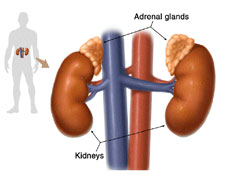Eunice Kennedy Shriver, JFK and Addison’s Disease

Eunice Kennedy Shriver, sister of President John F. Kennedy, and Senators Robert and Ted Kennedy has died at a hospital in Hyannis, MA. One of her most important legacies is as the founder of Special Olympics. Inspired by a sister, Rosemary Kennedy, with learning disabilities, Mrs. Shriver began the Special Olympics in 1968, to encourage involvement in physical activity and competition opportunities for people with intellectual disabilities. She was also was a key founder of the National Institute of Child Health and Human Development (NICHD) at the National Institutes of Health. In 1984, President Ronald Reagan awarded Eunice Shriver the highest civilian honor, the Presidential Medal of Freedom for her advocacy work with the intellectually disabled.
Although we don’t know the exact cause of Mrs. Shriver’s death, we do know she has suffered a number of strokes in the past few years and also that she had Addison’s Disease, a disease that she shared with her brother, President John F. Kennedy as described in the book The Health of the Presidents by J.R. Bumgarner (see below)
Addison’s Disease is a disorder of the adrenal gland, a pair of triangular shaped organs that sit on top of each kidney. The adrenals are responsible for making a number of hormones, most notable of which are cortisol and aldosterone.

Cortisol has many important functions, in that it:
- helps maintain blood pressure and cardiovascular function
- helps slow the immune system’s inflammatory response
- helps balance the effects of insulin in breaking down sugar for energy
- helps regulate the metabolism of proteins, carbohydrates, and fats
- helps maintain proper arousal and sense of well-being
Aldosterone helps maintain blood pressure and water and salt balance in the body by its actions on the kidney. Addison’s Disease (also called Adrenal Insufficiency), is a disease where the body is unable to produce enough cortisol (and/or aldosterone). There are a number of causes: 1. An autoimmune response to the cells of the adrenal gland slowly destroying the cells and decrease adrenal function. 2. As part of an inherited disorder called polyendocrine deficiency syndrome, where family members may show more than one endocrine (hormone) problem. 3. Tuberculosis, not a frequent cause today,though it was the reason that Dr. Addison originally discovered the disease in the late 1800’s.
Symptoms include:
- Weight loss
- Muscle weakness
- Fatigue that gets worse over time
- Low blood pressure
- Patchy or dark skin
- Difficulty dealing with infections, stress
To keep Addison’s Disease under control, patients must take medication daily to replace the missing hormones (replacement dose). Many medicines, called glucocorticoids can replace the action of cortisol.
The most commonly recommended are hydrocortisone, dexamethasone, or prednisone . At times of stress, such as an illness or upcoming surgery, the dosage must be increased to help the body deal with the stressful situation.

[AMAZONPRODUCT=0449911713] [AMAZONPRODUCT=0516293753] [AMAZONPRODUCT=0786420677]
























5 Comments